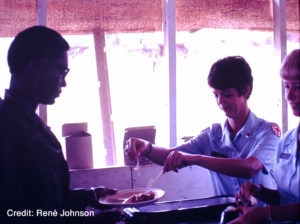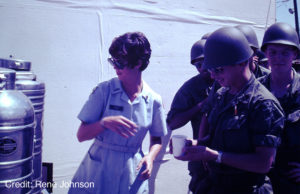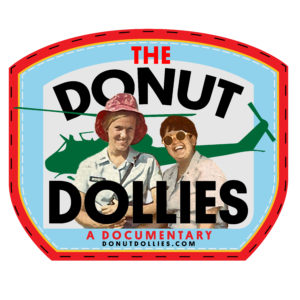In our twenty-third edition of the Donut Dollie Detail, René tells how she wanted to find out for herself why the U.S. was in Vietnam, that visiting the more critically injured soldiers in the hospitals was challenging, and how after her 1-year tour as a Donut Dollie, she missed Vietnam so much that she returned with U.S. Army Special Services in the Service Club division.
Please share the Donut Dollie Detail with family, friends and veterans you may know, and make sure to like/follow us on Facebook to learn when the next edition is posted. You can also share your email address with us at list@donutdollies.com for updates on the upcoming release of the Donut Dollies Documentary (we will not share/sell your email and will only use it for Donut Dollie related updates).
Please meet Red Cross Donut Dollie René Johnson…
 What prompted you to join the SRAO (Supplemental Recreation Activities Overseas) program and want to go to Vietnam?
What prompted you to join the SRAO (Supplemental Recreation Activities Overseas) program and want to go to Vietnam?
As an Army brat whose father had been in Vietnam, who dated soldiers who had been there, and a college student in the late ‘60s, when the anti-war movement was very strong, I felt a need to go there and try to find out for myself why we were there.
When and where were you stationed in Vietnam? Did you go by a nickname?
I was at Chu Lai with Americal Division from April – October 1969, then at Cu Chi with the 25th and the last brigade of the 9th Infantry Division from Oct ’69 – April ’70. Both were Clubmobile-only units (daily flights to firebases). I never was assigned to a recreation center (on base duty). René actually was a nickname then. Now, it’s my legal name.
The Red Cross program that we worked for was “Supplemental Recreational Activities Overseas”. But we were called Red Cross Girls or Donut Dollies, not “SRAOers”. In fact, I never personally heard the term “SRAO Donut Dollies”. A unit was generally referred to by its location, such as “Americal Red Cross Girls”, “Dong Tam Red Cross Girls”, “Lai Khe Red Cross Girls”, etc., etc.
 What was a routine day like in Vietnam?
What was a routine day like in Vietnam?
Get on a helicopter around six in the morning, go to one or two fire support bases (dependent on size), program for at least 5 hours of the day, serve lunch to the guys, fly home, shower and then work on the next program we were developing. Maybe one or two nights a week go to one of the clubs with friends.
Did you ever have any “close calls” either on base or in any vehicles?
I had one, not on a base, not in a vehicle. It wasn’t really frightening until after it was over and I was back at a base and fully realized what had happened.
Were you ever injured while in Vietnam?
No.
What was it like to visit the soldiers in the hospitals?
It depended on which hospital. At the 2 med-surg units at Chu Lai, a lot of the guys had sustained fairly minor wounds, or had contracted malaria or some other illness, and were recovering and usually going back into the field. They were easier to talk and kid around with, although some were bitter about having to go back into harm’s way. At the major evac hospital, the wounds were far more critical, limbs lost, faces badly damaged, so hard to look at, and trying to convince the guys that their girlfriends or wives would still love them, would not be bothered by the way they would now look. Those were the days when it was really hard to keep that smile going, when it felt so ‘plastic’ and insincere.
How was the transition returning home to the United States?
Difficult. I went back to Vietnam. Then I had to come home again. I’m not sure that it was ever a complete transition; part of me stayed behind. I didn’t ever experience any insults or shown disrespect for having gone, but neither did any but a few really understand or care about what we did over there.
After my first tour in Vietnam, I stayed with the Red Cross and was stationed at Camp Lejeune, NC. But I missed so much about Vietnam, especially the daily flying to the men in the field. I didn’t feel as though I had finished my job. The opportunity arose to return to Vietnam with U.S. Army Special Services in the Service Club division not long after arriving at Camp Lejeune, and I jumped at the chance. Working in a Service Club was very much like working in a Red Cross Center. It was anticlimactic, to say the least, and not nearly as fulfilling as my Donut Dollie year. Morale of the troops had sunk lower than ever, and drug use had increased dramatically, both in numbers and types of drugs used. It was not at all the same.
What would you like people to remember and understand most about the women who served?
That we were there because we cared about the military personnel, to provide support for them, even if we did not support the war.
 How do you feel Veterans think of your time having served with them? Have any Veterans expressed their feelings to you directly?
How do you feel Veterans think of your time having served with them? Have any Veterans expressed their feelings to you directly?
I’ve heard personally from many Veterans, and seen so many positive comments on web sites and Facebook pages. I do not allow people to post to my FB page, but I’ve got a long, long list of really wonderful posts that were sent to me but which do not appear on my time line. I’ve never had a derogatory comment made directly to me, but every once in a great while I will see one on another page or site, but then other veterans take that person to task!
The majority have very positive impressions, and I have heard from the men who feel that way often. Now, because I am an admin on a large Vietnam Veterans Facebook page, I get positive feedback, via either comments or private messages, almost daily.
 What are your fondest or most interesting memories of your time serving in Vietnam?
What are your fondest or most interesting memories of your time serving in Vietnam?
Christmas week of 1969, caroling with a mixed group of military men, nurses, Special Services women and us Donut Dollies, followed by two days of doing a little play, the whole unit flying in one helicopter, to many firebases, and being given our own private outhouse on Nui Ba Den as our Christmas present.
Driving around the base camp at Duc Pho in a jeep with a Scout Dog handler during our lunch hour, around, around, around ………. And having time to really talk. (His first daughter was named for me.)
My 2nd week at my first assignment, being ‘bugled in’ by the bugler for ‘B’ troop, 2/17th Cav, 101st Avn. The unit had come down from Phu Bai to assist Americal during Operation Lamar Plain. The afternoon they arrived, their CO called our office and wanted to know when we were going to visit his men. Well, I’d never heard of them, but our Program Director came to the office right after the call, so we got our driver to take us up to where the CO had told us they were setting up. Sure enough, when we turned the corner, the bugler proceeded to blow “Charge” and guys came running from everywhere!!! It was one of the most truly amazing moments of my time there.
 NOTE: Never did I serve doughnuts, cookies or anything else (other than meals in the chow line) except on a few rare occasions when mess sergeants would make something because they knew we were coming, and then let us ‘serve’ them. Yet, strangely, we still hear from guys who think that they remember us coming out to the field with boxes of doughnuts or cookies. When our email group has discussed this, no one recalls ever doing that. However, we are only about 100 of the 627 who served, but we do represent pretty much all of the years and all of the units. I did serve Kool-Aid. Lots and lots and lots of Kool-Aid!
NOTE: Never did I serve doughnuts, cookies or anything else (other than meals in the chow line) except on a few rare occasions when mess sergeants would make something because they knew we were coming, and then let us ‘serve’ them. Yet, strangely, we still hear from guys who think that they remember us coming out to the field with boxes of doughnuts or cookies. When our email group has discussed this, no one recalls ever doing that. However, we are only about 100 of the 627 who served, but we do represent pretty much all of the years and all of the units. I did serve Kool-Aid. Lots and lots and lots of Kool-Aid!
PLEASE NOTE: THERE ARE 22 PREVIOUS EDITIONS OF THE DONUT DOLLIE DETAIL THAT CAN BE SEEN HERE, JUST SCROLL DOWN TO READ EACH (AT THE BOTTOM, YOU’LL SEE A LINK TO GO TO THE NEXT PAGE OF DONUT DOLLIE DETAIL FEATURES)

Nicely done, Rene; the pictures are great.
Thank you for your Service and Welcome Home from a Vietnam Veteran.
Thanks, Rene. I was a grunt with the 101st in I corps in 71, and I’m pretty sure our paths didnt cross, but I remember being on the firebases when you all would come out. It was a great break from the dirty dreary grind, and wwe all loved your visits. Thanks again.